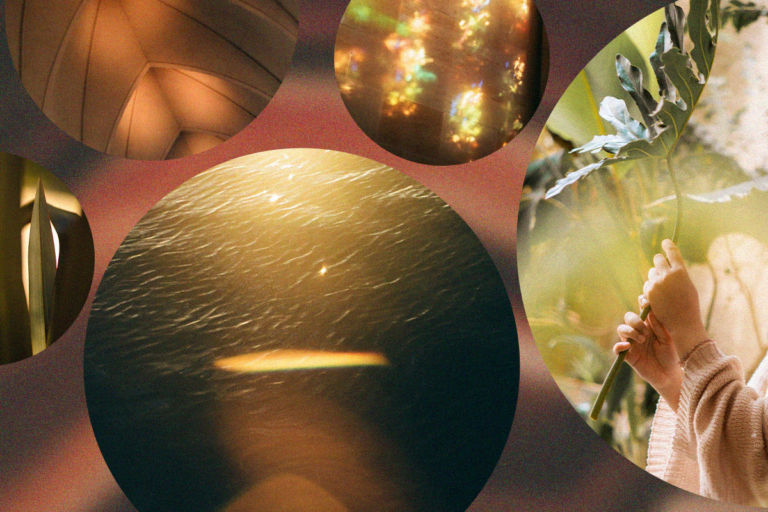The Venerable Thich Nhat Hanh, revered Zen master, teacher, and poet, died on January 22, 2022, in his native Vietnam. Brother Thay, as he was known by his community and students, transmuted what he had experienced of chaos and bloodshed in his country and his life into an ability to speak with equal measures directness and compassion to the many conflicts and bewilderments of contemporary life. Martin Luther King Jr. nominated him for the Nobel Peace Prize. He was a great teacher of the wonderful practice of “walking meditation.” He taught a way of living to face suffering, fear, and violence inside and beyond ourselves and yet to become “fresh, solid, and free.” Krista sat with him for this rare conversation in the early years of this show, and it has touched many. It is astonishing to re-experience the deep, enduring wisdom this monk leaves for our world now.
Spiritual Genius
Featured Items
“I like it much better than ‘religious’ or ‘spiritual’ — to be a seeker after the sacred or the holy, which ends up for me being the really real.”
– Rev. Barbara Brown Taylor
From Krista, about this week’s show:
It’s fascinating to trace the arc of spiritual searching and religious belonging in my lifetime. The Episcopal priest and public theologian Barbara Brown Taylor was one of the people I started learning about when I left diplomacy to study theology in the early 1990s. At that time, she was leading a small church in Georgia. And she preached the most extraordinary sermons, and turned them into books read far and wide. Then in 2006, she wrote Leaving Church — about her decision to leave her life of congregational ministry, finding other ways to stay, as she’s written, “alive and alert to the holy communion of the human condition, which takes place on more altars than anyone can count.”
She’s written other books since, with titles like An Altar in the World, Learning to Walk in the Dark, and Holy Envy: Finding God in the Faith of Others. Being in the presence of Barbara Brown Taylor’s wonderfully wise and meandering mind and spirit, after all these years of knowing her voice in the world, is a true joy. I might even use a religious word — it feels like a “blessing.” And this is not a conversation about the decline of church or about more and more people being “spiritual but not religious.” We both agree that this often-repeated phrase is not an adequate way of seeing the human hunger for holiness. This is as alive as it has ever been in our time — even if it is shape-shifting in ways my Southern Baptist and Barbara’s Catholic and Methodist forebears could never have imagined.
View
- List View
- Standard View
- Grid View
44 Results
Filters
Jon Kabat-Zinn has learned, through science and experience, about mindfulness as a way of life. This is wisdom with immediate relevance to the ordinary and extreme stresses of our time — from economic peril, to parenting, to life in a digital age.
The 13th-century Muslim mystic and poet Rumi has long shaped Muslims around the world and has now become popular in the West. Rumi created a new language of love within the Islamic mystical tradition of Sufism. We hear his poetry as we delve into his world and listen for its echoes in our own.
What happens when people transcend violence while living in it? John Paul Lederach has spent three decades mediating peace and change in 25 countries — from Nepal to Colombia and Sierra Leone. He shifts the language and lens of the very notion of conflict resolution. He says, for example, that enduring progress takes root not with large numbers of people, but with relationships between unlikely people.
Karen Armstrong speaks about her progression from a disillusioned and damaged young nun into, in her words, a “freelance monotheist.” She’s a formidable thinker and scholar, but as a theologian she calls herself an amateur — noting that the Latin root of the word “amateur” means a love of one’s subject. Seven years in a strict religious order nearly snuffed out her ability to think about faith at all. Here, we hear the story behind Armstrong’s developing ideas about God.
One of today’s most influential spiritual teachers shares his youthful experience of depression and despair — suffering that led him to his own spiritual breakthrough, and ultimately, freedom and peace of mind. He also explicates his view of what he calls “the pain body” — the accumulated emotional pain that may influence us and our relationships in negative ways. And Tolle talks about spirit and God, and what those concepts mean to him.
In over 50 years as a Benedictine nun, Sister Joan Chittister has emerged as a powerful and uncomfortable voice in Roman Catholicism and in global politics. If women were ordained in the Catholic Church in our lifetime, some say, Joan Chittister would be the first female bishop.
A great public theologian and historian, Martin Marty offers personal and historical perspective on religion in modern life — including the nature of fundamentalism, and the decline of America’s mainline Protestant majority as Evangelical Christianity gains in influence.
A survivor of the Holocaust, in which he lost most of his family, Wiesel was a seminal chronicler of that event and its meaning. Wiesel shares some of his thoughts on modern-day Israel and Germany, his understanding of God, and his practice of prayer after the Holocaust.
The Pause
Join our constellation of listening and living.
The Pause is our seasonal Saturday morning ritual of a newsletter. Replenishment and invigoration in your inbox. Wisdom to take into your week. And when you sign up, you’ll receive ongoing, advance invitations and news on all things On Being.
Search results for “”
View
- List View
- Standard View
- Grid View
Filters
